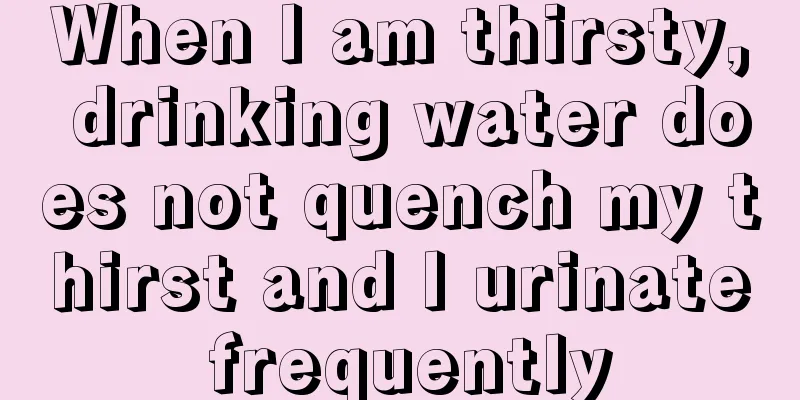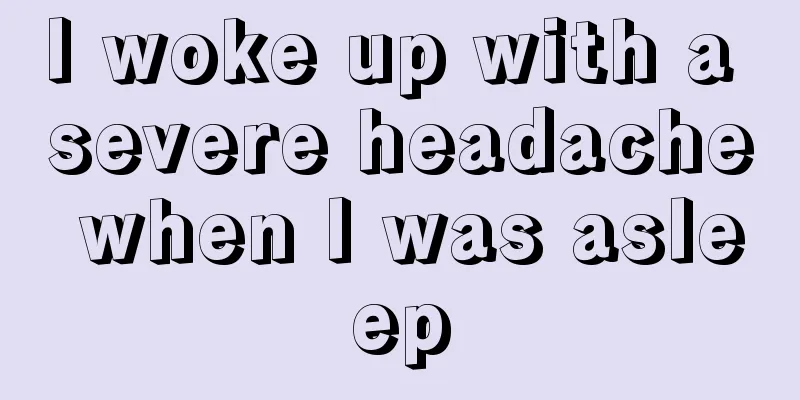When I am thirsty, drinking water does not quench my thirst and I urinate frequently

|
Many people will drink a lot of water when they are thirsty. Although they drink a lot of water, they still feel thirsty, which makes many people very anxious. If you drink too much water, you will urinate more and more frequently, which is very detrimental to everyone's work. So what are the reasons why drinking water does not quench your thirst and you urinate more frequently? Let us take a detailed look at the following content. First, drinking water when you are thirsty does not quench your thirst and causes frequent urination. Normally, thirst is our brain's way of warning us when we haven't drunk enough water and are becoming dehydrated. For example, we feel thirsty when we lose body fluids due to excessive sweating, diarrhea, or vomiting. Likewise, certain foods we eat (such as salty or spicy foods) may also cause thirst. At this time, as long as you drink enough water, you can usually relieve thirst and restore body fluid balance quickly. However, if thirst is persistent and excessive (called polydipsia), there may be an underlying problem in your body. When you feel thirsty in the following situations, it is not because your body is extremely dehydrated. Second, lack of water in the human body causes thirst. People will feel thirsty when the weather is hot, when doing heavy physical labor, when losing blood, when suffering from burns, when vomiting, when having diarrhea, or when sweating profusely due to high temperature (heat stroke). This is because the thirst is caused by severe lack of water in the human body. In this condition, people often experience symptoms such as dry mouth, haggard face, sunken eye sockets, and dry and inflexible skin. Some people may experience thirst symptoms because they eat too much salt that day. Third, thirst caused by diabetes. One of the functions of hormones is to coordinate the metabolism of water and salt in the human body. Once the balance of this hormone is disrupted, it can cause constant thirst. Many diabetic patients have high blood sugar, which causes a sharp increase in urine output. At this time, even if you drink a lot of water, you will still feel unbearable thirst. Another reason why drinking water does not quench your thirst and causes frequent urination is thirst caused by brain damage. Some people also experience thirst after a brain injury or neurosurgery. The patient is often fatal within a day or even an hour, which is very dangerous. At this time, diabetes insipidus worsens. Patients should drink 10 or even 20 liters of water every day. This is because the patient lacks the so-called "urination-limiting hormone" in the body. |
<<: What causes thirst during early pregnancy
>>: Is it normal to feel thirsty after taking diet pills?
Recommend
What's the matter with the black spots on my body
It is also quite common to have black spots on th...
What to do with advanced colorectal cancer
Advanced colorectal cancer is indeed a worrying t...
What tests should be done for lung cancer? Three tests that must be done for lung cancer
The occurrence of lung cancer is life-threatening...
Severe facial redness and swelling? This will reduce swelling!
Many women will have redness and swelling on thei...
What are the treatments for advanced lung cancer? Introduction to TCM treatments for advanced lung cancer
The best treatment for advanced lung cancer is tr...
What to eat after esophageal cancer surgery to recover faster
The arrival of esophageal cancer is very harmful ...
Treatment of ovarian cancer
Ovarian cancer brings a lot of harm to our lives....
How to store leftovers in summer?
In the hot summer, many things are difficult to p...
Abnormal leucorrhea is actually a sign of advanced cervical cancer. Come and learn about the 6 signs of cervical cancer
Cervical cancer is a common malignant tumor in gy...
The difference between flat warts and syringoma
Flat warts and syringomas are both very common di...
Why do I feel dizzy all of a sudden?
Dizziness is a very common phenomenon in life. It...
Types of root canal filling materials
We usually see many types of root canals, and mos...
What factors can lead to the occurrence of bile duct cancer
Human birth, aging, illness and death are often i...
Will picking your ears touch your eardrum?
I believe that many people like to clean their ea...
What to do about nail warts? Such treatment is effective
Nail warts are a common skin disease that is high...









